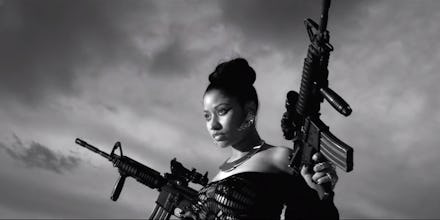How Female Rappers Have Taken Back the Word "Bitch," and Made It Their Own

When asked her motto on the French TV show Question Box, Nicki Minaj growled seven powerful words: "I'm a bad bitch; I'm a cunt."
We're guessing that the French audience maybe didn't quite get it, but to an American audience, Minaj's motto makes total sense: Minaj and a growing army of feMCs are transforming the meaning of one of our most demeaning words. Suddenly, thanks to female rappers, bitch is a positive term, a quality in women worth celebrating.
Much of Minaj's career has been dedicated to dismantling the double standards accompanying the word "bitch." She's been talking about it since she first emerged on the scene in 2010: "When I am assertive, I'm a bitch. When a man is assertive, he's a boss. He bossed up. No negative connotation behind 'bossed up.' But lots of negative connotation behind being a bitch. Donald Trump can say, 'You're fired.' Let Martha Stewart run her company the same way and be the same way: 'Fucking old, evil bitch!'"
But Minaj is not alone. Nearly all up-and-coming female rappers (and there are many) have taken the word on like a battle cry. The opening track on Azalea Banks' blow-up debut EP is pretty straightforward: "I'm a rude bitch, nigga, what are you made of?" As far as introductions go, you don't get a more direct one than that. So many singers have taken on the word that its usage in hip-hop has completely sky-rocketed to coincide with the rise of the new class of feMCs. And it's producing a sea-change in how we think about women in power.
Image Credit: RapGenius
Female rappers have been turning "bitch" around just as male rappers re-appropriated the N-word in the early '90s. Arguably, the shift in the meaning of "bitch" began when Lil Kim spit one of the most direct and potent diatribes on the word on the Missy Elliot track "Checkin For You," where she describes both of them as "rich motherfuckin' bitches." That album is an ode to bitchiness — Elliot's "She's A Bitch" drew heavily from her work with legendary diva Whitney Houston. Elliot worked with her on the track "In My Business," and the "take-charge" attitude Houston showed in the studio proved to Missy, like it would to Minaj, that "bitch" was just another word for "boss."
That record laid the groundwork for feMCs like Lady of Rage, Angel Haze, Trina, Awkwafina and Iggy Azalea to inundate our culture in a whole new meaning of the word. Slowly, "bitch" has become a symbol of an economically empowered woman who isn't afraid of what she wants. It's a new word to fit a new, more accurate model of success and womanhood.
To some, seeing the use of the word skyrocket might make it seem like the Tygas of the world (see: "Bad Bitches") are winning. But think about this: Before 1991, the N-word was so taboo it rarely appeared in any music. When iconic rap group N.W.A. released Niggaz4Life in May '91, they flipped the history of that word on its head. The title track, especially, was a series of vicious responses to the question, "Why you brothers insist on usin the word nigga?" Dr. Dre's verse stands out especially: "So why not call myself a nigga? / It's better than pullin the trigger and goin up the river / And then I get called a nigga anyway."
After that, the average frequency of the word in rap never dropped below two uses per song. You can imagine the same question being asked of our female MCs. The answer? So nobody else can say it for them.